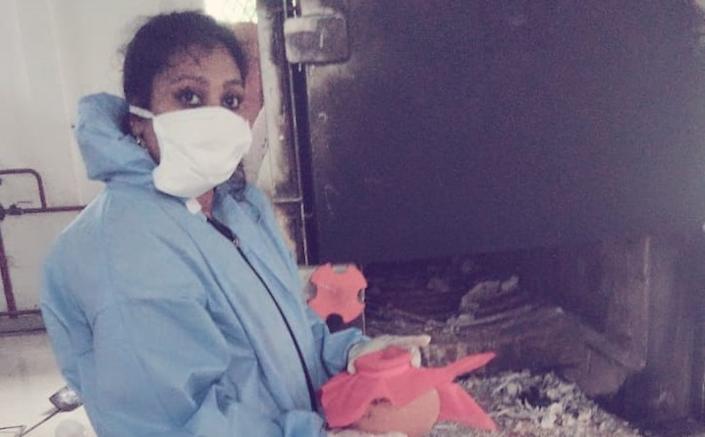Irinjalakuda (Thrissur), KERALA :

Subeena Rahman has been supervising funerals at an electric crematorium run by the SNBS Samajam at Irinjalakuda in Kerala’s Thrissur, since the last two and a half years. Amid the devastating wave of the coronavirus, the 29-year-old cremator along with her male coworker Sunil has been cremating almost 10 COVID dead bodies daily from Hindu and Christian communities.
The crematorium is run by the Hindu minority Ezhava community. She informs that if higher authorities permit, they could even perform cremations at night in view of the piling number of COVID-dead.
What prompted Rahman to take up a job at a crematorium? “Financial burden is the main reason for entering into such a job,” she informs. “Since my son was little at that time, I took up work at this crematorium as it’s near my house. This way I manage both my work and my child. I also save on food, travel and other expenses.”
But, being a funeral director is an unusual career choice for a woman. “Initially, I was ashamed to tell people that I work at a crematorium,” says Rahman. People had several questions for her and their own biases. Among handful women in a male-dominated bastion, Rahman stands true to her duty in managing after-death rituals in India, a profession that also intersects with her own identity as a minority Muslim woman.
Hindu funeral rites are officiated by the Brahmanical priestly class, and age-old tradition has prescribed against the presence of women at a funeral site making the space a preserve of men and patriarchy. But, at a time when COVID-19 is taking a devastating toll on people in the state, and families, friends and priests have turned their face away from the dead, Rahman’s role of overseeing the funeral passage of Hindu and Christian communities assumes greater significance. She has not only broken the gender divide but also that of religion when it comes to performing Hindu upper-caste last rites. While she and her colleague would only cremate the dead of the Ezhava earlier, the pandemic and its ensuing strain on human resources has only meant they now cremate bodies irrespective of caste.
Taking pride in her work, Rahman serves as a frontline worker attending to the dead; giving them dignity at a time when the dead are merely statistics, or bodies wrapped in plastic bags. Her work is as much technical as much as it stems from a space of empathy.
So, how does it work? Well, Rahman has to lay a dead body inside the crematorium to cremate. Booking for the next cremation is accepted only after a gap of one and a half hours, the time taken to cremate a body. The presence of just two chambers allows only two bodies to be cremated at a time.
During the first wave, there were only one to two COVID-related cremations. “But since the second wave hit, it has been challenging to manage the amount of work with just the two of us but we are somehow dealing with it,” says Rahman.
Rahman was initially designated as an office staff for duties pertaining to accounting and paperwork. A male coworker was responsible for cremation duties. “As I used to sit alone, I started accompanying him and soon my interest shifted to that work. It’s been two and a half years and I am still doing this work,” she informs.
Reflecting on her role, Rahman is quick to remind that gender equality is not about big ideas but groundwork and self-mobilisation as a response to one’s immediate surroundings. She asks, “Is there differentiation between a man and a woman’s work? If we have the guts, we can do any work. Women are doing all kinds of work from climbing coconut trees to driving trucks, so this differentiation should change. If we can climb coconut trees; why can’t we cremate?”
(Subeena Rahman’s quotes translated from Malayalam by Apurva P.)
(Edited by Amrita Ghosh)
source: http://www.in.makers.yahoo.com / Makers India – Yahoo / Home> Makers / by Sanhati Banerjee and Apurva P / May 20th, 2021








